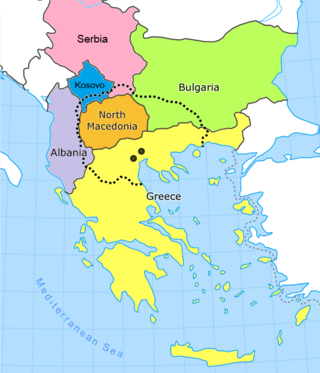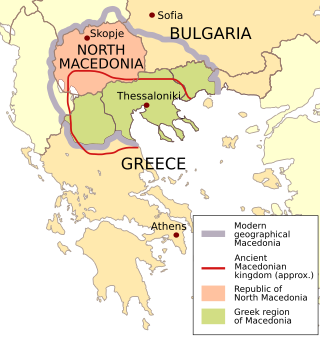See also
List of archives in Europe | |
|---|---|
| Sovereign states |
|
| States with limited recognition | |
| Dependencies and other entities | |
This is a list of archives in North Macedonia.
The history of North Macedonia encompasses the history of the territory of the modern state of North Macedonia.

The flag of North Macedonia depicts a stylized yellow sun on a red field, with eight broadening rays extending from the center to the edge of the field. It was created by Miroslav Grčev and was adopted on 5 October 1995.

The Rainbow is a political party in Greece, and a member of the European Free Alliance. It is known for its activism amongst what it regards as the ethnic Macedonian minority in Greece and their descendants abroad. The Rainbow states that it sees the acceptance of the Republic of North Macedonia in the European Union with a positive regard.

Macedonians are a nation and a South Slavic ethnic group native to the region of Macedonia in Southeast Europe. They speak Macedonian, a South Slavic language. The large majority of Macedonians identify as Eastern Orthodox Christians, who share a cultural and historical "Orthodox Byzantine–Slavic heritage" with their neighbours. About two-thirds of all ethnic Macedonians live in North Macedonia and there are also communities in a number of other countries.

Blagoevgrad Province, also known as Pirin Macedonia or Bulgarian Macedonia, is a province (oblast) of southwestern Bulgaria. It borders four other Bulgarian provinces to the north and east, the Greek region of Macedonia to the south, and North Macedonia to the west. The province has 14 municipalities with 12 towns. Its principal city is Blagoevgrad, while other significant towns include Bansko, Gotse Delchev, Melnik, Petrich, Razlog, Sandanski, and Simitli.

The Ilinden–Preobrazhenie Uprising, or simply the Ilinden Uprising, of August–October 1903, was an organized revolt against the Ottoman Empire, which was prepared and carried out by the Internal Macedonian-Adrianople Revolutionary Organization, with the support of the Supreme Macedonian-Adrianople Committee, which included mostly Bulgarian military personnel. The name of the uprising refers to Ilinden, a name for Elijah's day, and to Preobrazhenie which means Feast of the Transfiguration. Some historians describe the rebellion in the Serres revolutionary district as a separate uprising, calling it the Krastovden Uprising, because on September 14 the revolutionaries there also rebelled. The revolt lasted from the beginning of August to the end of October and covered a vast territory from the western Black Sea coast in the east to the shores of Lake Ohrid in the west.

The North Macedonia national football team represents North Macedonia in men's international football, and is administered by the Football Federation of Macedonia. The team play their home matches at the Toše Proeski National Arena in Skopje.

Macedonia most commonly refers to:

Southeast Europe or Southeastern Europe (SEE) is a geographical sub-region of Europe, consisting primarily of the region of the Balkans, as well as adjacent regions and archipelagos. There are overlapping and conflicting definitions of the region, due to political, economic, historical, cultural, and geographical considerations.

Macedonia or macédoine is a French culinary term referring to a salad composed of small pieces of fruit or vegetables. Fruit Macedonia is a fresh fruit salad and is a common dessert in Greece, Romania, Spain, France, Italy and South America. Vegetable Macedonia or Macédoine de légumes nowadays is usually a cold salad or hors d'oeuvre of diced vegetables, in France often including red beans. Macédoine de légumes is also a hot vegetable dish consisting of the same vegetables served with butter. Prepared macédoine, a mixture of diced vegetables and often peas, is often sold canned or frozen. It is sometimes mixed with mayonnaise combined with aspic stock, making it similar to Russian salad.

Macedonia is a geographic and former administrative region of Greece, in the southern Balkans. Macedonia is the largest and second-most-populous geographic region in Greece, with a population of 2.36 million. It is highly mountainous, with major urban centres such as Thessaloniki and Kavala being concentrated on its southern coastline. Together with Thrace, along with Thessaly and Epirus occasionally, it is part of Northern Greece. Greek Macedonia encompasses entirely the southern part of the wider region of Macedonia, making up 51% of the total area of that region. Additionally, it widely constitutes Greece's borders with three countries: Albania to the northwest, North Macedonia to the north, and Bulgaria to the northeast.

The name Macedonia is used in a number of competing or overlapping meanings to describe geographical, political and historical areas, languages and peoples in a part of south-eastern Europe. It has been a major source of political controversy since the early 20th century. The situation is complicated because different ethnic groups use different terminology for the same entity, or the same terminology for different entities, with different political connotations.

The use of the country name "Macedonia" was disputed between Greece and the Republic of Macedonia between 1991 and 2019. The dispute was a source of instability in the Western Balkans for 25 years. It was resolved through negotiations between the two countries, mediated by the United Nations, resulting in the Prespa Agreement, which was signed on 17 June 2018. Pertinent to its background is an early 20th-century multifaceted dispute and armed conflict that formed part of the background to the Balkan Wars. The specific naming dispute, although an existing issue in Yugoslav–Greek relations since World War II, was reignited after the breakup of Yugoslavia and the newly-gained independence of the former Socialist Republic of Macedonia in 1991. Since then, it was an ongoing issue in bilateral and international relations until it was settled with the Prespa agreement in June 2018, the subsequent ratification by the Macedonian and Greek parliaments in late 2018 and early 2019 respectively, and the official renaming of Macedonia to North Macedonia in February 2019.

The accession of North Macedonia to the European Union has been on the current agenda for future enlargement of the EU since 2005, when it became an official candidate for accession. The Republic of Macedonia submitted its membership application in 2004, thirteen years after its independence from Yugoslavia. It is one of nine current EU candidate countries, together with Albania, Bosnia and Herzegovina, Georgia, Moldova, Montenegro, Serbia, Turkey and Ukraine.

Cinema of North Macedonia refers to film industry based in North Macedonia or any motion-picture made by Macedonians abroad. Janaki and Milton Manaki are considered the founding fathers. The first feature film produced by the country was Frosina (1952) and the most famous director is Milčo Mančevski. The first and only Macedonian movie theater chain is Kinoverzum.

North Macedonia, officially the Republic of North Macedonia, is a landlocked country in Southeast Europe. It shares land borders with Greece to the south, Albania to the west, Bulgaria to the east, Kosovo to the northwest and Serbia to the north. It constitutes approximately the northern third of the larger geographical region of Macedonia. Skopje, the capital and largest city, is home to a quarter of the country's population of 1.83 million. The majority of the residents are ethnic Macedonians, a South Slavic people. Albanians form a significant minority at around 25%, followed by Turks, Roma, Serbs, Bosniaks, Aromanians and a few other minorities.
The Macedonian Women's League is a women's football league of North Macedonia.

The Museum of the Republic of North Macedonia, formerly and still unofficially known as the Museum of Macedonia, is a national institution in North Macedonia and one of the oldest museums in the country. It is located in the Old Bazaar in Skopje, near the Skopje Fortress. The Museum of the Republic of North Macedonia was created by joining three museums in one. The three museums that were unified were the archaeological, historical and ethnological museum, of which the archaeological museum was the oldest one; it was opened in 1924 and that date is considered as an establishing date of the national museum. During the existence of the Socialist Republic of Macedonia, the museum was known as People's Museum of Macedonia.